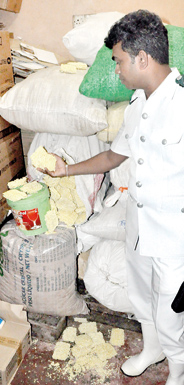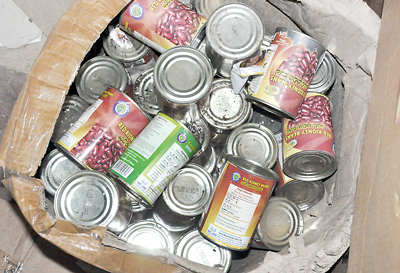News
Importers’ tricks stink as bad as the food they sell
Whether it’s the rich man’s can of baked beans or box of corn flakes or the poor man’s dried fish and onions, expired and rotten food is entering the market in large quantities, especially during festive seasons when importers find it easier to dump such items on an unsuspecting public. Recent raids by the Consumer Affairs Authority and Colombo Municipal Council revealed warehouses belonging to leading importers as well as small-scale importers and distributors stacked with huge stocks of spoiled or risky items.

On December 24 about 4,000kg of spoiled dried fish covered with fungi, and 3,000kg of rotten onions were recovered from a warehouse on Fourth Cross Street in Pettah by Consumer Affairs Authority (CAA) officers. The items were to be sold to small eating houses and shops.
This was just a few days after more than 5,000kg of rotten potatoes were seized from a storehouse in Dambulla by police. The potatoes were to be sold to eating houses, bakeries and lunch packet suppliers. The Colombo Municipal Council’s Public Health Department, last week, raided a four-storey warehouse in Pettah that was full of expired imported items including some children’s favourites. Among the expired goods were 2700 cans of baked beans, 384 bottles of mayonnaise, 30 bottles of BBQ sauce, 70 tins of jack mackerel, 55kg of cashew nuts, 6,000 packets of orange-flavoured drinks, 70 packets of corn flakes, 96 bottles of raspberry jam and 900kg of noodles.
Recently the CAA raided a Welisara warehouse of a milk powder company to find a large stock of expired cheese. In another instance the CAA recovered about 6,000kg of chilli powder made of expired chilli flakes in Wattala.
The Sunday Times learns that some leading importers buy up items that are close to best-before dates, having got them at low prices. This food is stored in distribution centres and warehouses to be sold to eateries, bakeries or retail shops, having sometimes been re-labelled.
Some countries find it easier to give such items to charity as destroying or discarding is costlier. As a result container-loads of goods that are close to expiry enter the market. Consumer Affairs Authority Chairman Rumy Marzook said traders were resorting to unethical and unprofessional practices with the support of leading importers.
“We will continue to raid such places and if investigations reveal that leading importers are involved we will not hesitate to taken strict legal action,” he said. Colombo’s Chief Medical Officer Dr. Pradeep Kariyawasam said re-labelling was taking place on a large scale with items found with the same batch number but with two different expiry dates.
“These expired stocks are sold to eating houses and the health of the people living and working in Colombo is put at risk. Corroded salmon tins are sold to eateries and bakeries. There are Chinese restaurants that use expired goods, like vinegar, fish sauce and tomato sauce,” he said.

The rot in Pettah and Dambulla: Pictures show what the recent raids conducted by the Consumer Affairs Authority and the CMC brought forth. Pix by Mangala Weerasekera and Kanchana Kumara Ariyadasa
Dr. Kariyawasam added that apart from expired food being sold from warehouses, cafes and restaurants prepared food under unhygienic conditions. The Colombo Municipal Council is to inspect all eating houses in the city next year.
“We recovered fungus-covered roti used to prepare kottu roti. It is acceptable to store prepared food but it should be kept at a low temperature. The freezers were not working properly in some eateries. The cooking and frying oils had not been changed for months and the utensils hadn’t been washed. These will all be inspected and those who do not maintain such requirements will be given closure orders,” Dr. Kariyawasam said.
Chemically- ripened fruit found
The Consumer Affairs Authority on Friday detected 75,000kg of fruits ripened with the use of the chemical ethephon in Pettah.
Ethephon, used to trigger the early ripening of fruits such as banana, papaya, mango, guava and avocado, is banned in some countries due to its harmful effects.
Worms in juice sold to top brand
A fresh juice factory in Polgahawela was sealed on Thursday (December 24) after Public Health Inspectors discovered large stocks of rotten fruit and fruits and juices containing worms.
The factory supplies juice to a leading manufacturer of cordial and jam, according to evidence given in court by the factory owner said Public Health Inspectors Union President Upul Rohana, adding that the brand was a children’s favourite.

